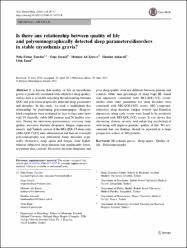| dc.contributor.author | Taşçılar, Nida Fatma | |
| dc.contributor.author | Saraçlı, Özge | |
| dc.contributor.author | Kurçer, Mehmet Ali | |
| dc.contributor.author | Ankaralı, Handan | |
| dc.contributor.author | Emre, Ufuk | |
| dc.date.accessioned | 10.07.201910:49:13 | |
| dc.date.accessioned | 2019-07-10T19:50:46Z | |
| dc.date.available | 10.07.201910:49:13 | |
| dc.date.available | 2019-07-10T19:50:46Z | |
| dc.date.issued | 2018 | en_US |
| dc.identifier.citation | Taşçılar, N., Saraçlı, Ö., Kurçer, M., Ankaralı, H. ve Emre, U. (2018). Is there any relationship between quality of life and polysomnographically detected sleep parameters/disorders in stable myasthenia gravis? Journal of Acta Neurologica Belgica, 118(1), 29-37. https://dx.doi.org/10.1007/s13760-017-0787-6 | en_US |
| dc.identifier.issn | 0300-9009 | |
| dc.identifier.issn | 2240-2993 | |
| dc.identifier.uri | https://dx.doi.org/10.1007/s13760-017-0787-6 | |
| dc.identifier.uri | https://hdl.handle.net/20.500.12511/2072 | |
| dc.description | WOS: 000427844400006 | en_US |
| dc.description | PubMed ID: 28456888 | en_US |
| dc.description.abstract | It is known that quality of life in myasthenia gravis is positively correlated with subjective sleep quality, still no data is available regarding the relationship between QOL and polysomnographically detected sleep parameters and disorders. In this study, we tried to highlighten this relationship, by performing polysomnography. Sleep-related complaints were evaluated in face-to-face interviews with 19 clinically stable MG patients and 26 healthy controls. During the interviews questionnaires assessing sleep quality, excessive daytime sleepiness, fatigue, depression, anxiety, and Turkish version of the MG-QOL 15-item scale [(MG-QOL15(T)] were administered and then an overnight polysomnography was performed. Sleep disorders, especially obstructive sleep apnea and fatigue were higher, whereas subjective sleep duration was significantly lower, in patients than controls. Excessive daytime sleepiness and poor sleep quality were not different between patients and controls. Other than percentage of sleep stage III, which was negatively correlated with MG-QOL15(T) scores, neither other sleep parameters nor sleep disorders were correlated with MG-QOL15(T) scores. MG composite, subjective sleep duration, fatigue severity and Hamilton depression rating scale scores were found to be positively correlated with MG-QOL15(T) scores. It was shown that decreasing disease severity and enhancing psychological well-being will improve patients' quality of life. We recommend that our findings should be repeated in a large prospective cohort of MG patients. | en_US |
| dc.language.iso | eng | en_US |
| dc.publisher | Springer Heidelberg | en_US |
| dc.rights | info:eu-repo/semantics/embargoedAccess | en_US |
| dc.subject | Myasthenia Gravis | en_US |
| dc.subject | Sleep Apnea | en_US |
| dc.subject | Quality of Life | en_US |
| dc.subject | Polysomnography | en_US |
| dc.title | Is there any relationship between quality of life and polysomnographically detected sleep parameters/disorders in stable myasthenia gravis? | en_US |
| dc.type | article | en_US |
| dc.relation.ispartof | Acta Neurologica Belgica | en_US |
| dc.department | İstanbul Medipol Üniversitesi, Tıp Fakültesi, Dahili Tıp Bilimleri Bölümü, Nöroloji Ana Bilim Dalı | en_US |
| dc.authorid | 0000-0003-0780-0783 | en_US |
| dc.identifier.volume | 118 | en_US |
| dc.identifier.issue | 1 | en_US |
| dc.identifier.startpage | 29 | en_US |
| dc.identifier.endpage | 37 | en_US |
| dc.relation.publicationcategory | Makale - Uluslararası Hakemli Dergi - Kurum Öğretim Elemanı | en_US |
| dc.identifier.doi | 10.1007/s13760-017-0787-6 | en_US |
| dc.identifier.wosquality | Q3 | en_US |
| dc.identifier.scopusquality | Q3 | en_US |


















